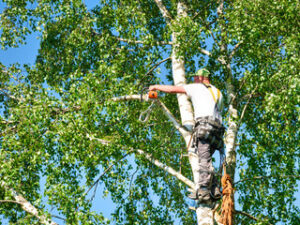A tree service is a business that removes or prunes trees in residential and commercial areas. They also provide other services like stump grinding, wood debris removal and fertilization.

They are also known as “tree doctors.” Their job is to diagnose the health of a plant, which includes identifying signs of disease or pest infestation. Visit Website to learn more.
Tree trimming can be a dangerous job for those not trained in the proper techniques and equipment. It’s important to hire a certified arborist who is experienced with the safe removal and maintenance of trees on residential properties. A professional will know how to identify signs of potential trouble such as a weakened trunk or broken branches. They will also use proper tools to perform the job safely. A good tree service will provide a risk assessment and safety briefing before starting work.
The right tree services will use a variety of tools and equipment to properly care for your trees, including chainsaws, bucket trucks, and cranes. They’ll also make sure that all of their employees are fully trained in the use of these tools. They should be certified by a recognized arboricultural association and carry insurance coverage to protect you in the event of an accident or damage to your property.
Choosing the right tree service is vital for your property’s safety and value. It’s also a great way to maintain the beauty of your yard and property. However, a number of factors can affect the health and safety of your trees, including improper pruning, soil conditions, insect infestations, and storm damage. It’s important to inspect your trees regularly to determine their health and safety, particularly after storms.
In addition to preventing property damage, tree services can reduce the risk of fires and power outages by removing dead or hazardous branches and limbs. They can also address problems such as a rotting trunk or insect infestations. These issues can be very serious and require professional intervention to save the tree.
Tree service workers face a number of challenges when performing their job, including ice and snow, slippery conditions, and harsh winds. They’re also exposed to the potential hazards of working near overhead power lines, which can cause fatal electrocution if touched. Moreover, the voltages on utility poles are often 100 times or more powerful than those in your home. Injuries and deaths among tree service workers are often the result of direct contact with these lines.
Reputation
A reputable tree service provides a variety of services related to the care and maintenance of trees. These services can enhance the aesthetics of a property, reduce risks associated with fallen or damaged trees, and improve overall property value. They are performed by certified arborists who are highly trained and skilled at their craft. The best way to find a reliable tree service is to ask for references from past clients and check their reputation in the community.
One of the most important aspects of a quality tree service is its expertise in tree trimming and pruning. This is essential to the health and longevity of a property’s landscape. An improperly pruned or trimmed tree can suffer from a wide array of problems, including damage to nearby homes and structures. Tree service professionals are specially trained to prune trees safely and effectively, reducing the risk of damage or injury.
Besides pruning and trimming, tree service providers also offer landscaping services, which include planting and landscape design. They can help homeowners choose the right plant species based on their needs, location, and aesthetic preferences. Moreover, they can advise on soil conditions and the appropriate use of fertilizers. They can also assist with the maintenance of existing trees on a property.
In addition to performing landscaping and tree care, a good tree service should be able to diagnose and treat pests and diseases. Arborists can identify early signs of disease and recommend treatment, preventing the need for removal. Moreover, they can prevent the spread of disease or insects to neighboring trees by removing symptomatic branches.
Moreover, a good tree service should provide a variety of other services, including land clearing and stump grinding. They can remove dead or dying trees and brush, along with limbs that hang over utility lines, block views, or encroach on property boundaries. They can also prune or trim overgrown trees and remove roots to prevent them from damaging sidewalks, driveways, and foundations. They can even remove stumps and grind them down to mulch or soil. In New York City, they can also clean up wood debris that is left behind after storms.
Insurance
A tree service provider should have a variety of insurance policies. These include general liability, professional liability, and inland marine insurance. Having these policies can help you cover costs if something goes wrong on the job. These policies can also protect you from lawsuits. For example, if one of your employees is injured by a chainsaw or another piece of equipment, these policies can provide medical care and compensation.
The cost of these policies can vary based on the type of business you run. For example, landscaping companies tend to have lower insurance rates than tree service providers. This is because tree trimming is less dangerous than other types of contracting work. However, you should always get a quote before choosing an insurer. This will give you an idea of how much your policy might cost and what coverages it includes.
General liability is one of the most important insurance policies for a tree service company. It covers third-party injuries and property damage, such as if a client trips over your equipment. Some tree services may bundle this policy with a commercial property insurance policy to save money. This type of policy covers your office and any other equipment you use to perform work on a customer’s property.
Another type of policy that tree services should have is workers’ compensation insurance. This is required in most states, and it covers medical expenses and lost wages for employees who are injured on the job. It also protects sole proprietors from work injury costs that health insurance might not cover.
If you’re hiring a tree service provider for a large project, ask about their insurance policies before signing any contracts. Reputable providers will have a certificate of insurance that they can show you. Make sure the certificate has their name on it and is directly from their insurer. Otherwise, it could be fake.
Other insurance policies that tree service providers should have include commercial auto, inland marine, and workers’ compensation. Commercial auto insurance provides protection for the vehicles that a tree service uses for business purposes. It can also include coverage for personal use of vehicles owned by employees or contractors. Inland marine insurance covers tools and supplies that are transported from the company’s home to a job site. It can also protect the equipment from theft or damage while in transit.
Pricing
The cost of tree services can vary depending on several factors. For example, the size of a tree can influence how much it costs to remove it. The height of a tree also affects how much it costs to trim it. Generally, shorter trees cost less to trim than taller ones. In addition, the type of tree matters. If it is a species that is difficult to maintain, then it may cost more to remove it. Finally, the location of the tree can also increase the price. If a tree is near power lines or close to other landscaping elements, it will require extra care and safety precautions.
In addition to removing dead or damaged trees, tree services can also help you with routine maintenance. They can trim branches that are overgrown or in danger of falling off. They can also clear away stumps and brush to prevent damage to sidewalks, driveways, or property foundations. They can even remove fallen tree debris after a storm.
Tree services can be expensive, but they are essential for the health and appearance of your landscape. These services are performed by trained professionals known as arborists or tree surgeons. They can diagnose and treat various tree diseases, as well as perform routine pruning and trimming. They can also provide advice on the best ways to maintain the health of your landscape.
When shopping for a tree service, you should always compare estimates and prices. In addition, you should always look for an arborist who is certified and insured. This will ensure that you receive the highest quality of work and that the company has the proper training and safety measures to protect its workers.
It is important to know that some companies will quote a lower price for tree removal and then add on additional services once they are at your property. If you are considering a company that quotes a low price, ask for an explanation and get all the services listed on your estimate in writing. This will protect you against scams and save you money in the long run.

